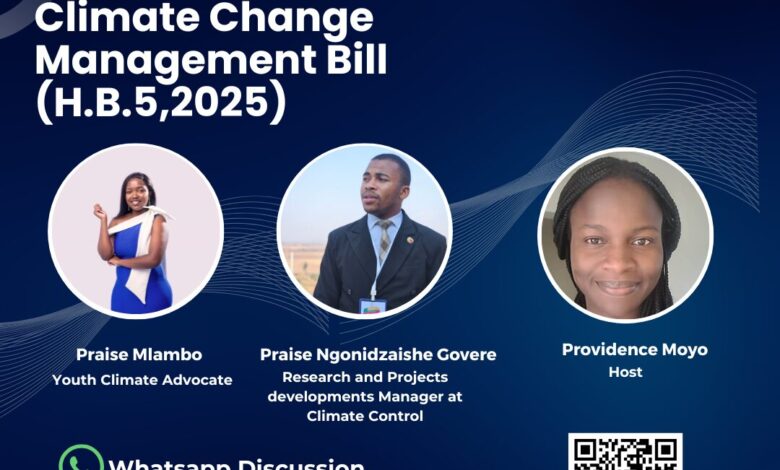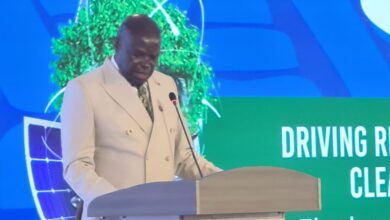Youth Voices Call for Inclusion in Zimbabwe’s Climate Change Management Bill

Matabeleland Pulse Reporter
In the latest edition of the Weekly Pulse WhatsApp discussion, young climate advocates examined the Climate Change Management Bill, 2025, highlighting its potential to strengthen Zimbabwe’s climate governance and calling for greater youth inclusion and awareness.
The discussion, moderated by Providence Moyo, featured Praise Mlambo, a youth climate advocate and legal practitioner, and Praise Govere, Research and Projects Development Manager at Climate Control.
Understanding Zimbabwe’s Climate Challenges
Opening the discussion, Praise Mlambo outlined some of the country’s pressing environmental issues. “Zimbabwe is facing numerous climate issues — droughts, heatwaves, flooding, and human health impacts.”
She said these impacts underline the need for a strong legal foundation for climate action, which the Bill seeks to provide through a coordinated national framework.
Why the Bill Matters
Praise Govere observed that existing climate regulations have faced challenges of weak coordination and limited funding.
“Issues in Zimbabwe’s climate change regulations include fragmented institutional responsibilities, gaps in greenhouse gas emissions management, and funding constraints for climate initiatives. That’s why we now see the Climate Change Management Bill being pushed to become an Act.”
He added that the Bill “aims to address these by consolidating climate governance, regulating emissions, establishing a carbon trading framework via the Zimbabwe Carbon Registry, and mobilizing resources through the National Climate Fund, aligning with constitutional environmental rights and global climate commitments.”
According to Clause 3 of the Bill, its objectives include establishing an institutional framework for managing climate change, reducing greenhouse gas emissions, promoting adaptation and mitigation, and mobilizing finance through mechanisms such as the National Climate Fund and a carbon trading system.
Main Pillars of the Framework
Mlambo summarized the Bill’s four key pillars:“The Bill seeks to make provision for institutional frameworks that supervise all activities related to climate change; mitigation and adaptation; to make provisions for low GHG emissions; and compliance.”
Govere added that it “will strengthen Zimbabwe’s approach to climate change through adaptation, mitigation, and resource mobilization balancing environmental protection with national development needs.”
Carbon Credit Registry and Transparency
A major feature of the Bill is the establishment of the Zimbabwe Carbon Credit Registry, under Clause 12, which will register and verify all carbon trading projects to ensure environmental integrity and transparency.
Explaining its role, Govere said:“The registry tracks and verifies carbon credits to ensure transparency. Every carbon project must be registered, then checks will be done to ensure credits are genuine. There will be regular updates on projects, and a committee will manage and monitor the process.”
Mlambo welcomed the move but highlighted the need for greater accessibility for young people.
“Setting up a carbon structure is a step in the right direction. However, I am not entirely convinced that it will automatically give access to climate finance. There’s still a lot to be desired in terms of awareness and capacity building for young people to fully participate in this market.”
She emphasized the importance of training programs and youth-focused financing mechanisms to ensure meaningful participation in the carbon market.
Governance and Inclusion
On the composition of the Registry’s board, Govere said that “governing aspects of carbon trading and the Zimcarbon registry will be appointed by the Minister responsible for Climate Change Management,” and will include “government officials in the Ministry, private sector and climate experts.”
The Bill guarantees, under Clause 5, every citizen’s right to access climate information and participate in decision-making, while also promoting transparency, accountability, and the inclusion of vulnerable groups.
Govere commended these provisions but said more could be done for youth inclusion.
“It is commendable that there is inclusion of vulnerable people in the Bill. As a young person, I would like to see provisions that prioritize youth inclusion, capacity building, and benefit sharing in the carbon credit framework.”
He proposed that a fixed share of carbon credit proceeds be set aside as youth climate finance to support innovation, education, and community-based projects.
Implementation, Compliance, and Incentives
On enforcement, Mlambo explained: “One of the objectives of the Bill is compliance. You will note that in the second schedule there are penalties for liability. Once the Bill is enacted and becomes law, its enforcement will automatically be possible.”
She also referred to Clause 38, which empowers the Minister to offer incentives for entities that reduce emissions or adopt renewable energy technologies. “By doing so, Zimbabwe will be reducing its greenhouse gas emissions, protecting its natural resources, and creating new economic opportunities,” she said.
Balancing Growth and Sustainability
Asked about the Bill’s implications for a developing economy, Mlambo noted:
“While it may attract foreign investment and generate revenue, the informal sector’s ability to comply with regulations could be a challenge. The Bill promotes sustainable development and environmental protection, but its success depends on building local capacity and ensuring fair benefit sharing.”
Youth at the Centre of Climate Action
As Zimbabwe continues nationwide public hearings on the Climate Change Management Bill, 2025, participants agreed that young people have a vital role to play in shaping the country’s climate policy.
Summarizing this view, Govere said: “As a young person, I would like the Bill to include specific provisions that promote youth participation in decision-making, capacity building in climate resilience, and active involvement in carbon markets, including fair benefit sharing from carbon credits. It should also integrate climate education, foster green job creation, and support youth-led climate innovation and community projects. This would mean setting aside a defined percentage of proceeds from carbon credits as dedicated youth climate finance.”
Both speakers agreed that empowering young people will be central to ensuring that the Bill translates from legislation into tangible action that protects the environment and supports sustainable livelihoods.





